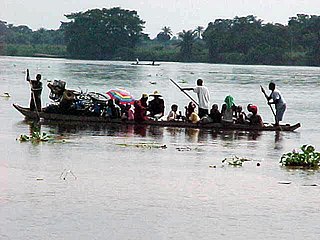
Bandundu is one of eleven former provinces of the Democratic Republic of the Congo. It bordered the provinces of Kinshasa and Bas-Congo to the west, Équateur to the north, and Kasai-Occidental to the east. The provincial capital is also called Bandundu.

The Kwilu River is a major river that originates in Angola and flows north through Bandundu Province in the Democratic Republic of the Congo (DRC) to the city of Bandundu, where it joins the Kwango River just before this stream enters the Kasai River. In the DRC the river flows past the towns of Gungu, Kikwit, Bulungu, Bagata, Rutherfordia and Bandundu. Lusanga, formerly Leverville, lies at the location where the Kwenge River joins the Kwilu, between Kikwit and Bulungu.

Kikwit is the largest city and capital of Kwilu Province, lying on the Kwilu River in the southwestern part of the Democratic Republic of the Congo. Kikwit is also known in the region under the nickname "The Mother". The population is approximately 397,737 (2012). An important commercial and administrative centre, it is home to a stadium and is known for its traditional dances, in particular the Bapende dancers whose geographic origin centers on the village of Gungu. Bapende dancers often wear traditional costumes comprising colorful masks and attire made from raffia. Kikwit is also home to an airport and is connected to the capital Kinshasa by a new road and river transport.

Bandundu, formerly known as Banningville or Banningstad, is a city in the Kwilu Province of the Democratic Republic of the Congo.
Pierre Mulele was a Congolese rebel active in the Simba Rebellion of 1964. Mulele had also been minister of education in Patrice Lumumba's cabinet. With the assassination of Lumumba in January 1961 and the arrest of his recognised deputy Antoine Gizenga one year later, Mulele became one of the top Lumumbists determined to continue the struggle. He went to Cairo, Egypt, as the representative of the Lumumbists' Congo National Liberation Committee based in Brazzaville. From Cairo he proceeded to China in 1963 to receive military training, and also took a group of Congolese youths with him, who received training in guerrilla tactics. He was a member of the Bapende ethnic group.

Idiofa is a town in Kwilu Province of the Democratic Republic of the Congo.

Bas-Fleuve District is a district located in the Kongo Central province, in the Democratic Republic of the Congo. It includes the Tshela, Lukula and Seke-Banza territories.

Idiofa Territory is an administrative area in the Kwilu Province of the Democratic Republic of the Congo. The capital is the town of Idiofa.
The Kwenge River is a stream in the Bandundu Province of the Democratic Republic of the Congo. It flows north from the Angolan border through the Kwango and Kwilu districts, joining the Kwilu River below Kikwit. Lusanga, formerly Leverville, is at the confluence of the Kwenge and Kwilu rivers.

Lusanga is a town in Kwilu District of Bandundu Province of the Democratic Republic of the Congo. It is at the confluence of the Kwenge and Kwilu rivers. The town is served by a small airport.

Gungu is a community in Kwilu Province, Democratic Republic of the Congo (DRC). It is the headquarters of Gungu Territory. The town lies on the Kwilu River. The estimated population as of 2012 was 23,893. Adolphe Muzito, appointed Prime Minister of the DRC in October 2008, was born in Gungu.

Bulungu is a community in the Kwilu Province of the Democratic Republic of the Congo. The town lies on the southwestern bank of the Kwilu River, downstream from Kikwit. Bulungu is the headquarters of the Bulungu Territory. As of 2012 the population was estimated to be 57,168.

Masi-Manimba Territory is an administrative area in Kwilu District, Bandundu Province, Democratic Republic of the Congo. Its headquarters are in the town of Masi-Manimba, on the Lukula River, a tributary of the Kwilu River. The Luie and Kafi rivers also run from south to north through the territory, tributaries of the Lukula. The territory is divided into ten sectors: Bindungi, Kibolo, Kinzenga, Kinzenzengo, Kitoy, Masi-Manimba, Mokamo, Mosango, Pay-Kongila and Sungu.

Masi-Manimba is a town in Kwilu Province, Democratic Republic of the Congo, the headquarters of the Masi-Manimba Territory. As of 2012 the population was estimated to be 31,802.
The Loange River is a tributary of the Kasai River. Originating in Angola, the river flows north through the eastern part of Kwango District, then continues north along the boundary between Kwilu District and Kasaï District to its mouth on the Kasai.

Kwilu-Ngongo Airport is an airport serving the city of Kwilu-Ngongo in Kongo Central Province, Democratic Republic of the Congo. The runway is 2 kilometres (1.2 mi) east of the city.








